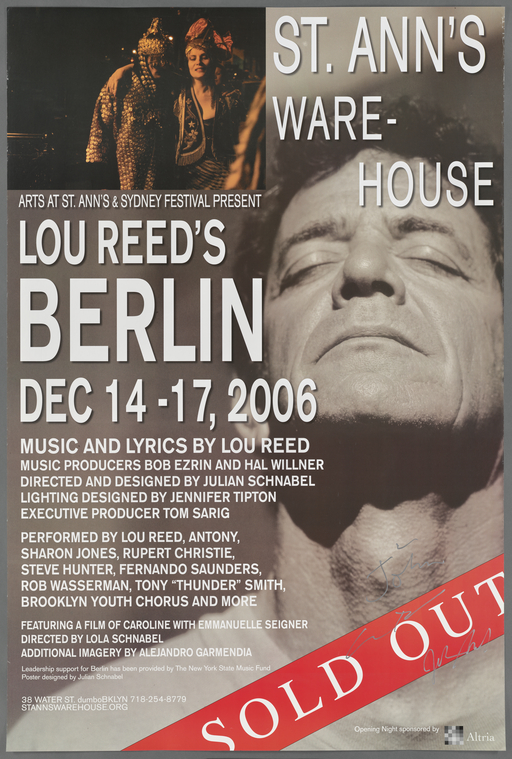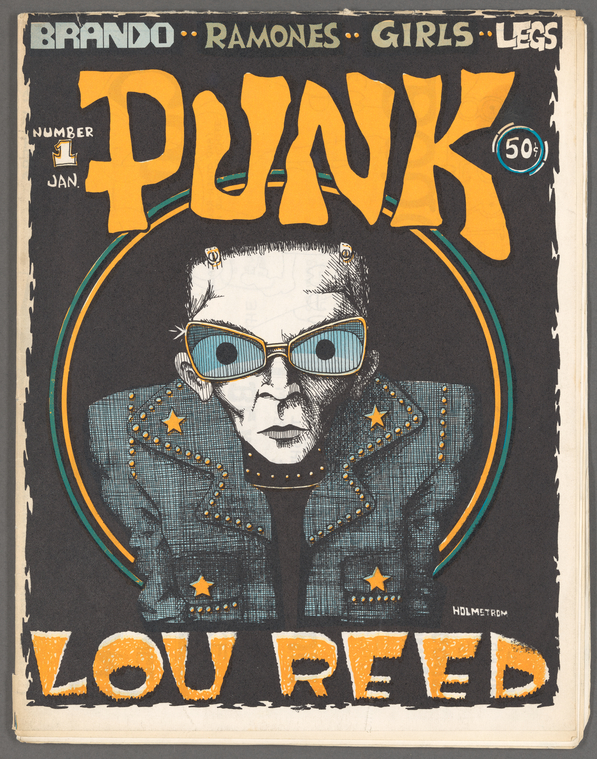The Start of an Era
Lou Reed had retired from music, taken up writing, and was exploring new circles. However, the thousands he had influenced in his 1960's career would not let him forget his one true love - Rock and Roll.
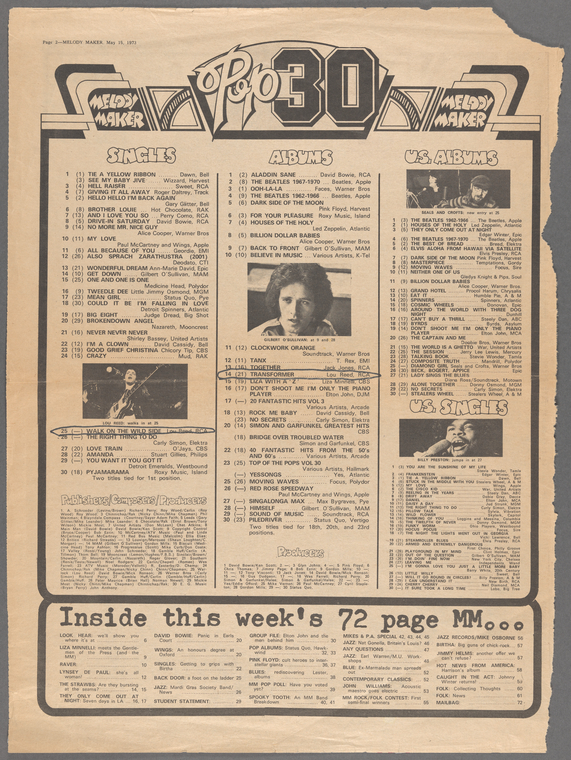
Check out this clipping in the Lou Reed Papers from the May 19, 1973 issue of Melody Maker that lists both Transformer at number 14 and "Walk on the Wild Side" at number 25.
(Lou Reed Paper)
Following the November release of Transformer, Lou Reed's career was rocketing upward. On RCA his contract stipulated one more release and everyone waited for it with baited breath. Under pressure to write or be forgotten, in a characteristic fit of writing that took him a single night during the Summer 1973, Reed wrote Berlin (1973). Reed and producer Bob Ezrin would call Berlin a Rock Opera, a format which was not designed with radio play in mind. According to his then wife Bettye Kronstad, he based "The Kids" and "The Bed" off of her private family life and their marital conflicts, adding embellishment and fictionalization.
Berlin was released in October 1973 to mixed reviews - partially from unmet expectations following Transformer, but mainly due to the album's dark and emotionally challenging subject matter and themes. The released was panned in the February 1974 issue of Creem by Robert Christgau in his Consumer Guide column, saying it was just "about two drug addicts who fall into sadie-mazie," yet writing more about it than any other. The issue earlier, December 1973, Lester Bangs lauded it as "the most disgustingly brilliant record of the year." Appreciated or panned, the album was thought provoking, and it's critical reception would prove to only grow - it would eventually be award number 344 in Rolling Stone's 500 Greatest Albums of All Time in 2003 and 2012. What Berlin had, though, was zero radio playability.
By late 1973 RCA, which had now released Lou Reed's first three solo albums, was put in the position of recouping it's costs on their inconsistent investment.
The Robinson's Couch
Lou Reed's path to Lou Reed, not to mention the rest of his solo career, was not obvious in mid 1971. It started when Danny Fields, publicist for The Doors who was responsible for getting The Stooges and MC5 signed to Elektra Records, introduced Reed to Lisa & Richard Robinson. It was at the Robinson's apartment where Reed would demo "Walk on the Wild Side" and it was through Richard Robinson's connection to RCA that would buy him his first post-Velvet Underground record deal.
Lisa & Richard Robinson where the the taste-makers of the underground New York rock scene through the '70s. Lisa Robinson, was raised in Manhattan and attended college at Syracuse University, after which she became a teacher and some-time DJ. Richard Robinson was a music columnist by day and DJ at WNEW-FM by night. In 1969 Richard had given Lisa one of his columns - in the British weekly music publication Disc and Music Echo - making her one of the first women music journalists. She promptly dove into that world, writing for Creem and New Musical Express and, by 1975, she was touring with The Rolling Stones and acting as their press liaison. During that time Richard Robinson had become respected as an A&R guru at first Buddah then RCA Records. But in 1971 the couple's E 74th St. Manhattan walkup apartment had already became a nexus for the up-and-coming and notable in the New York music scene. (For more about the Robinson's world this New Yorker article by Wendy Goodman is great: An Upper East Side Apartment Full of Rock And Roll Memories.)
Introduced to them by Danny Fields, Lou Reed and his first wife Bettye Kronstad would attend parties at the Robinson's apartment. The Robinson's saw the now nascent musical potential in Reed, and fostered his songwriting, allowing him to hold-court with his acoustic guitar in their living room. This is where Reed's breakout radio-hit "Walk on the Wild Side" was debuted, and it was with Richard Robinson's help that got him signed to the label that would soon release it - RCA.
As if the Robinsons hadn't done enough for Lou Reed, in September of 1971 Lisa Robinson introduced him to David Bowie - a then rising-star of the British pop world - who would collaborate with Reed and produced his second solo album.
- Lou Reed & Richard Robinson InterviewsTrack 1: interview starts at 20:45
Track 2: interview starts at 19:23
Alice Tully Hall - Solo Reed
Lou Reed at Alice Tully Hall
Lou Reed's first concert in New York City as a solo performer was January 27, 1973 at none-other than Alice Tully Hall at Lincoln Center for the Performing Arts - just a block away from Library for the Performing Arts, where the Lou Reed Papers reside today.
Thanks to the success of his 2nd solo album Transformer (1972), Lou Reed and the Tots had, in December 1972, just finished a European tour supporting Reed's first album.
Available at the Library: 1970-1979
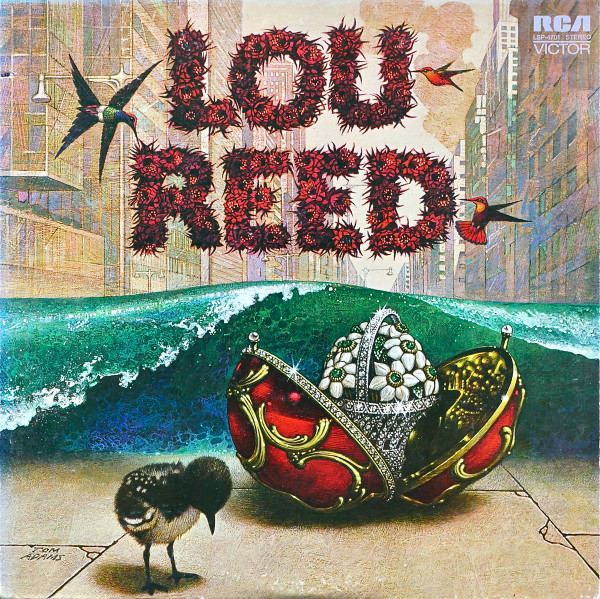 Lou Reed by
I can't stand it (2:34)
Going down (2:53)
Walk and talk it (3:38)
Lisa says (5:29)
Berlin (5:13)
I love you (2:16)
Wild child (4:39)
Love makes you feel (3:09)
Ride into the sun (3:13)
Ocean (5:04)
Call Number: *LZR 72360 [Disc]Publication Date: 1972
Lou Reed by
I can't stand it (2:34)
Going down (2:53)
Walk and talk it (3:38)
Lisa says (5:29)
Berlin (5:13)
I love you (2:16)
Wild child (4:39)
Love makes you feel (3:09)
Ride into the sun (3:13)
Ocean (5:04)
Call Number: *LZR 72360 [Disc]Publication Date: 1972Transformer [Extended Edition] by Vicious (2:55) Andy's chest (3:20) Perfect day (3:46) Hangin' 'round (3:35) Walk on the wild side (4:15) Make up (3:00) Satellite of love (3:42) Wagon wheel (3:19) New York telephone conversation (1:33) I'm so free (3:09) Goodnight ladies (4:21) Hangin' 'round (acoustic demo) (3:57) Perfect day (acoustic demo) + "Transformer" Radio Advertising (Hidden Track) (4:50).
Call Number: CD ROCK Reed,Lou-9673Publication Date: 1972Berlin by Berlin -- Lady day -- Men of good fortune -- Caroline says (I) -- How do you think it feels -- Oh, Jim -- Caroline says (II) -- The kids -- The bed -- Sad song.
Call Number: CD ROCK Reed,Lou-2900Publication Date: 1973Rock N Roll Animal by Intro/Sweet Jane (7:46) -- Heroin (13:13) -- How do you think it feels (previously unreleased) (3:41) -- Caroline says I (previously unreleased) (3:55) -- White light/white heat (5:21) -- Lady Day (3:52) -- Rock 'n' roll (9:33).
Call Number: CD ROCK REED,LOU-2135ISBN: 9786305818113Publication Date: 1974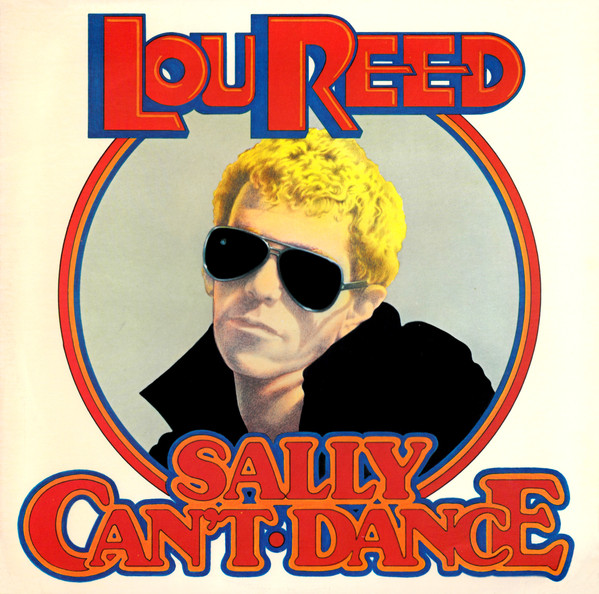 Sally Can't Dance by
Ride Sally ride -- Animal language -- Baby face -- N.Y. stars -- Kill your sons -- Ennui -- Sally can't dance -- Billy -- Good taste -- Sally can't dance (Single version).
Call Number: *LDC 37381 [CD]Publication Date: 1974
Sally Can't Dance by
Ride Sally ride -- Animal language -- Baby face -- N.Y. stars -- Kill your sons -- Ennui -- Sally can't dance -- Billy -- Good taste -- Sally can't dance (Single version).
Call Number: *LDC 37381 [CD]Publication Date: 1974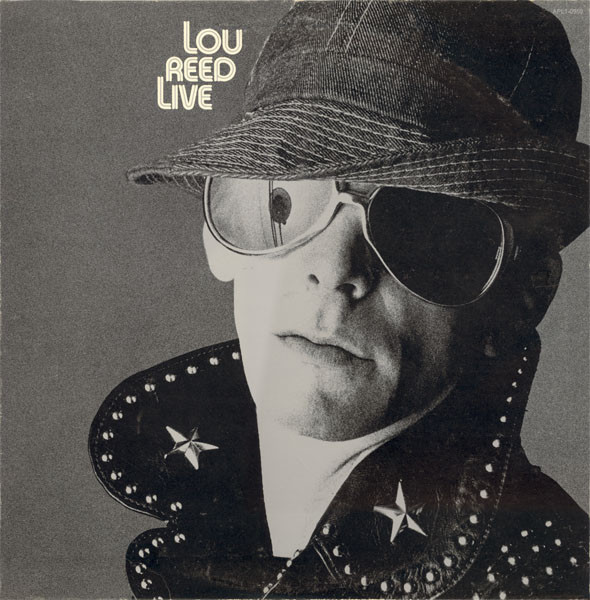 Lou Reed Live by
Vicious (5:55)
Satellite of love (6:03)
Walk on the wild side (4:51)
I'm waiting for the man (3:38)
Oh Jim (10:40)
Sad song (7:32)
Call Number: *LZR 39586Publication Date: 1975
Lou Reed Live by
Vicious (5:55)
Satellite of love (6:03)
Walk on the wild side (4:51)
I'm waiting for the man (3:38)
Oh Jim (10:40)
Sad song (7:32)
Call Number: *LZR 39586Publication Date: 1975Metal Machine Music by Part 1 -- Part 2 -- Part 3 -- Part 4.
Call Number: CD ROCK Reed,Lou-8483Publication Date: 1975Rock and Roll Heart by I believe in love -- Banging on my drum -- Follow the leader -- You wear it so well -- Ladies pay -- Rock and roll heart -- Chooser and the chosen one -- Senselessly cruel -- Claim to fame -- Vicious circle -- A sheltered life -- Temporary thing.
Call Number: *LDC 37413 [CD]Publication Date: 1976Lou Reed Live - Take No Prisoners by Disc 1: Sweet Jane -- I wanna be black -- Satellite of love -- Pale blue eyes -- Berlin -- I'm waiting for my man. Disc 2: Coney Island baby -- Street hassle -- Walk on the wild side -- Leave me alone.
Call Number: CD ROCK REED,LOU-4328Publication Date: 1978
